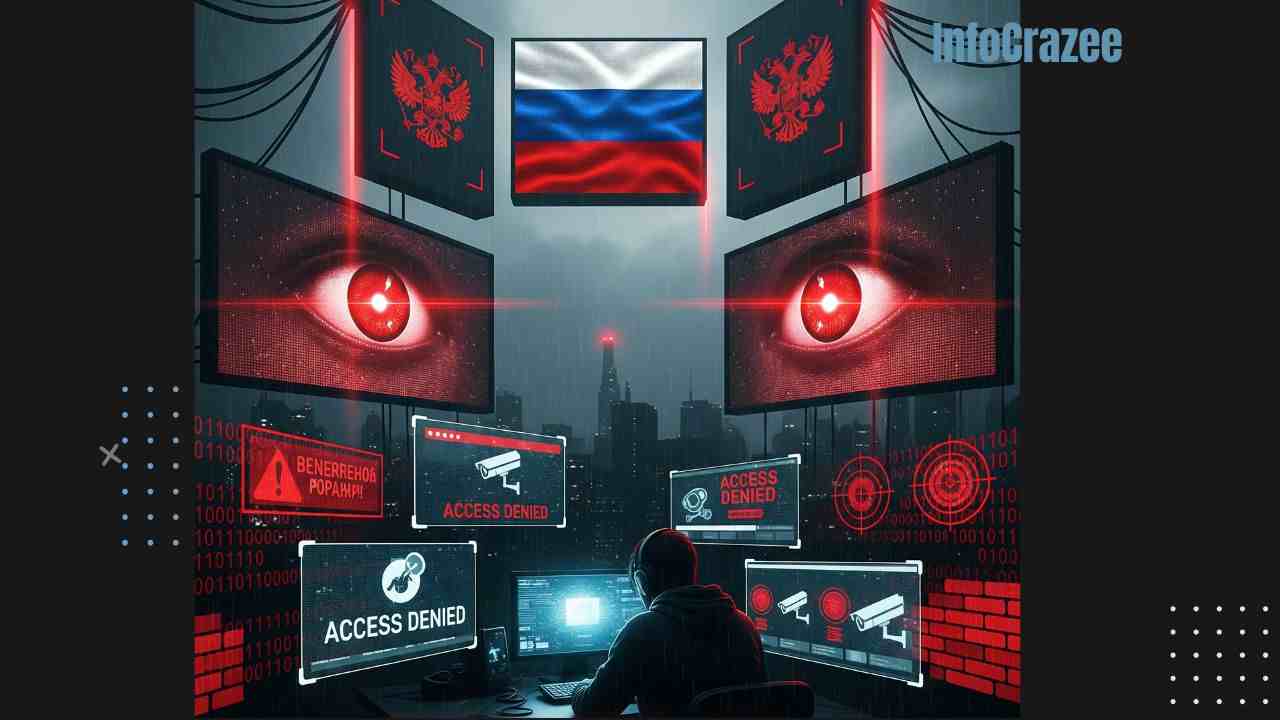The Cyber Gulag: How Russia Monitors, Censors, and Controls Its Citizens Online
Russia’s internet, once a space for free expression, has become a tightly controlled digital landscape, dubbed a “cyber gulag” by activists and rights advocates. Through advanced surveillance, widespread censorship, and strategic infrastructure control, the Kremlin is intensifying efforts to monitor and suppress online activity, creating an environment where going online can be frustrating, complicated, and even dangerous.
A Multi-Pronged Crackdown
The Russian government’s push to control the internet, which began escalating after the 2011-12 protests coordinated online, has reached new heights in 2025. Authorities have deployed a sophisticated arsenal of tools to track, censor, and manipulate online behavior. Surveillance cameras equipped with facial recognition, like those that detained journalist Yekaterina’s Maksimova five times in 2023, are now ubiquitous in cities like Moscow, targeting activists and protesters with chilling precision.
New laws passed in July 2025 punish users for accessing “illicit” content, even through private searches, creating a climate of fear. Stanislav Seleznev, a cybersecurity expert with the Net Freedom rights group, notes that while tracking every search in a nation of 146 million is impractical, selective prosecutions are designed to deter dissent. “Even a few cases can scare people away from restricted content,” he told Euronews.
Censorship and Platform Control
Major platforms like YouTube, Facebook, and Instagram face severe restrictions or outright bans, with access often reduced to blank pages or throttled connections. In June 2025, internet infrastructure provider Cloudflare reported that websites using its services were being throttled in Russia, alongside other Western hosting providers. This push to force businesses onto controllable Russian servers has made global websites increasingly inaccessible. Cyber lawyer Sarkis Darbinyan of Roskomsvoboda estimates that half of Russia’s websites still rely on foreign hosting, but this number is shrinking as authorities consolidate control.
The Kremlin is also targeting messaging apps. Lawmaker Anton Gorelkin has warned that WhatsApp, with over 97 million monthly users in Russia, may be blocked, to be replaced by MAX, a state-backed “national” messenger developed by VK. Launched for beta testing in 2025, MAX integrates messaging, payments, and government services but has struggled to gain traction, with only 2 million users by July, according to Tass. Telegram, however, is likely to remain unrestricted due to its compliance with government demands.
AI and Surveillance: A Growing Threat
The use of artificial intelligence to monitor social media and websites is expanding, raising fears of automated censorship on an unprecedented scale. The Belarusian hacktivist group Cyber Partisans revealed that Russian authorities are developing bot systems to infiltrate social media groups for surveillance and propaganda. “The Kremlin is great at disinformation campaigns and has high-class IT experts creating dangerous products,” said Cyber Partisans coordinator Yuliana Shametavets.
This follows a pattern of escalating digital control. After Russia’s 2022 invasion of Ukraine, censorship spiked, with individuals like Marina Novikova fined over $12,400 for antiwar Telegram posts and activist Mikhail Kriger sentenced to seven years for Facebook comments. Such prosecutions, even on blocked platforms, underscore the message: no user is safe.
A Sovereign Internet and Global Isolation
Russia’s vision of a “sovereign internet,” detachable from the global web, is becoming reality. Laws mandating data storage by cellphones operators and internet providers, coupled with requirements for taxi companies to share passenger data with the FSB, signal a broader system of “total digital surveillance, coercion, and punishment,” according to analyst Tatyana Stanovaya.
Human Rights Watch researcher Anastasiia Kruope describes this as a “death by a thousand cuts,” with incremental restrictions edging Russia closer to complete internet isolation. While virtual private networks (VPNs) offer a workaround, authorities are increasingly blocking them, and mobile internet shutdowns have become routine, lasting hours or days.
A Chilling Effect
The Kremlin’s tactics are not just about control but intimidation. By combining pervasive surveillance, selective prosecutions, and infrastructure manipulation, Russia is creating an environment where citizens self-censor out of fear. As Darbinyan warns, “The lack of transparency in how these systems work is horrible—it leads to more censorship.” With the internet increasingly resembling a digital prison, Russia’s “cyber gulag” is reshaping how its citizens navigate the online world.






